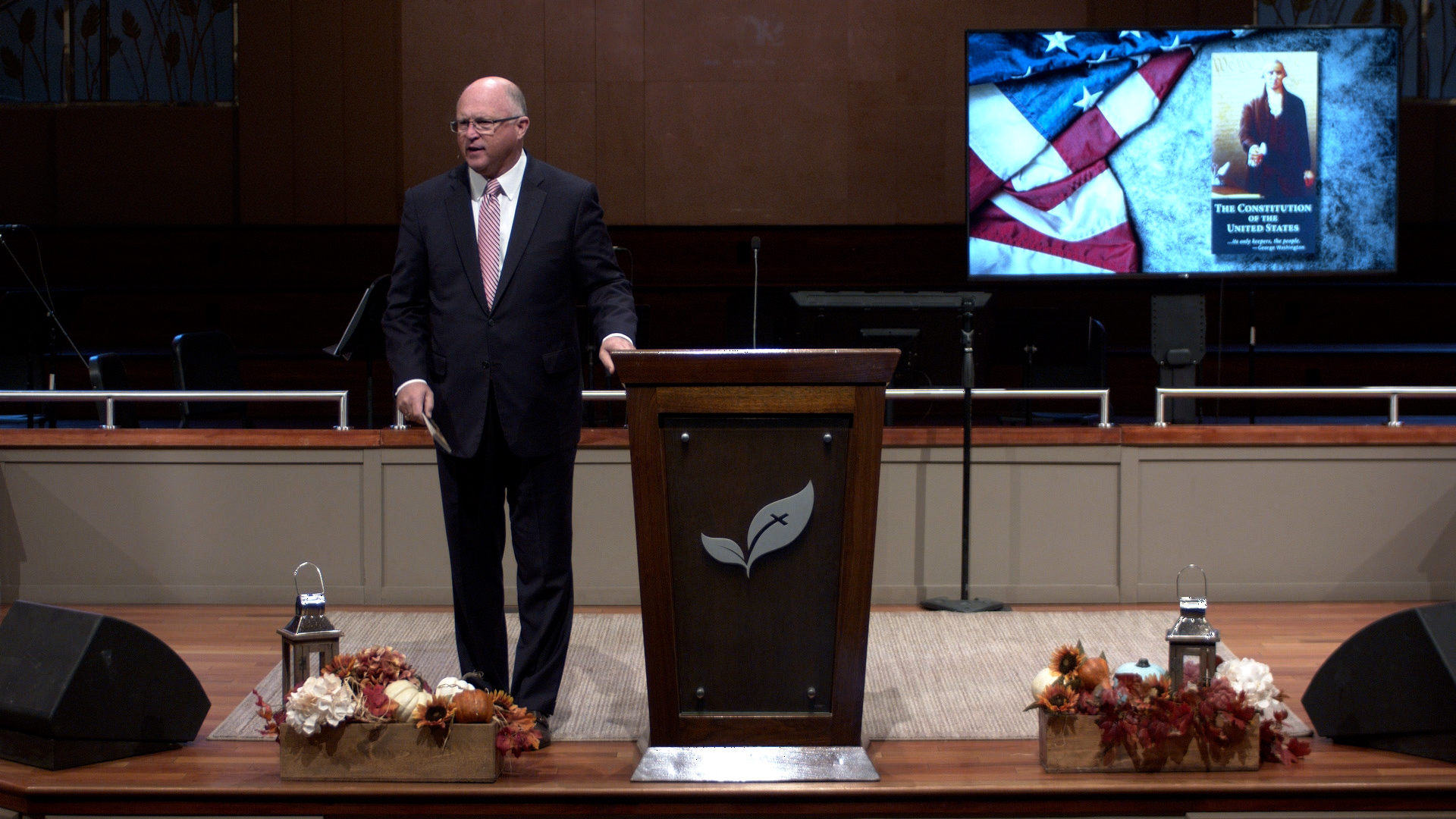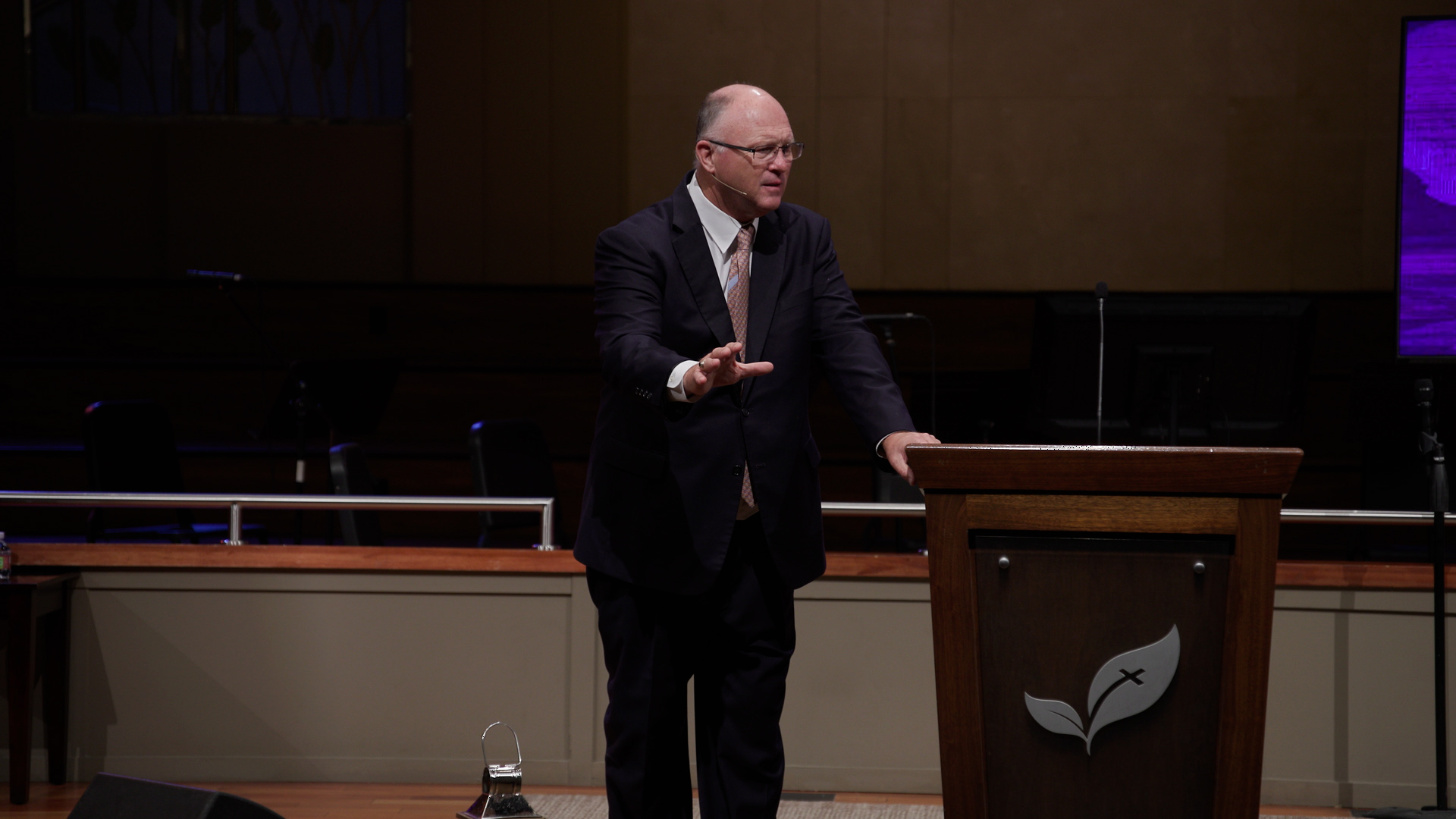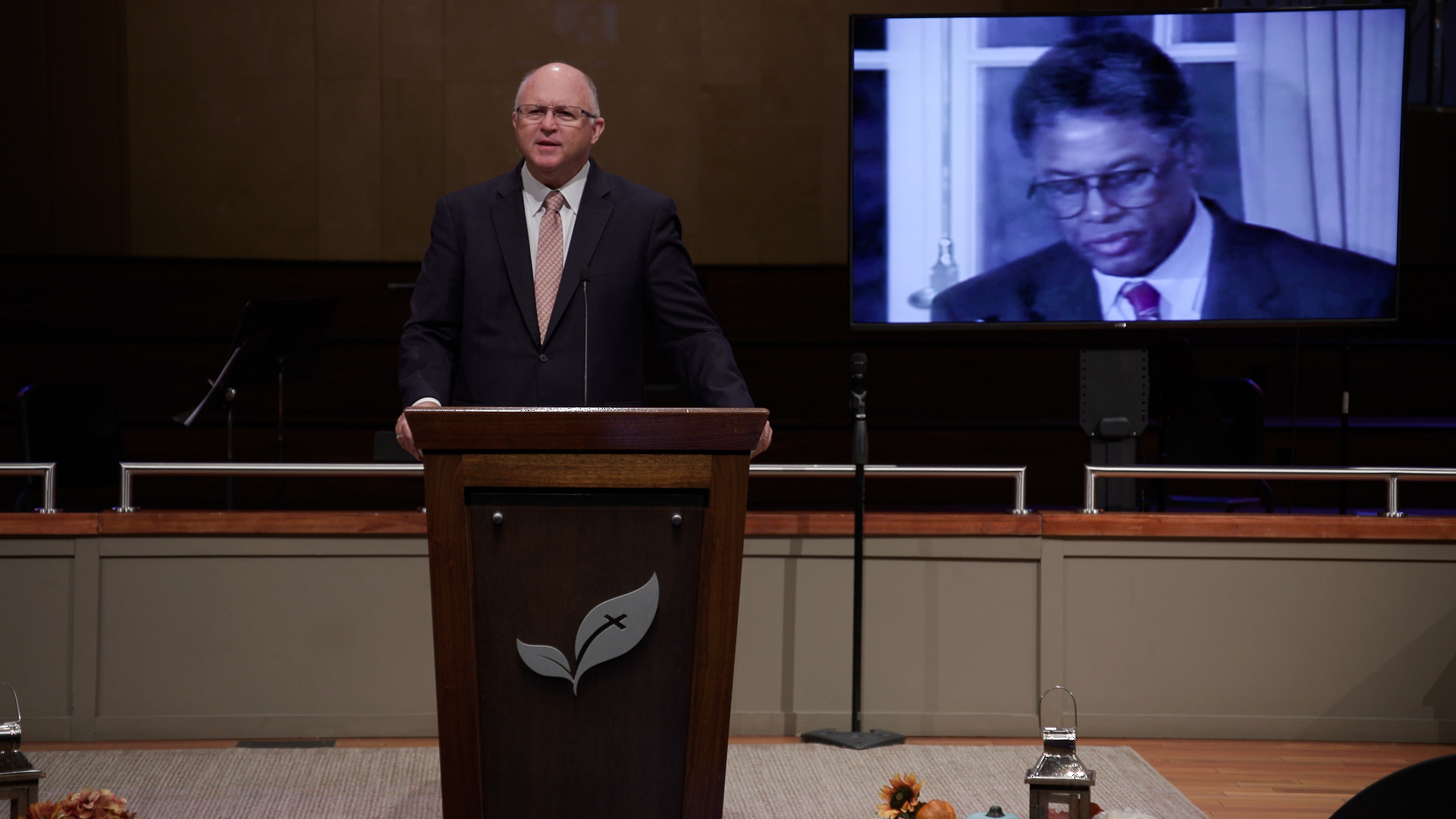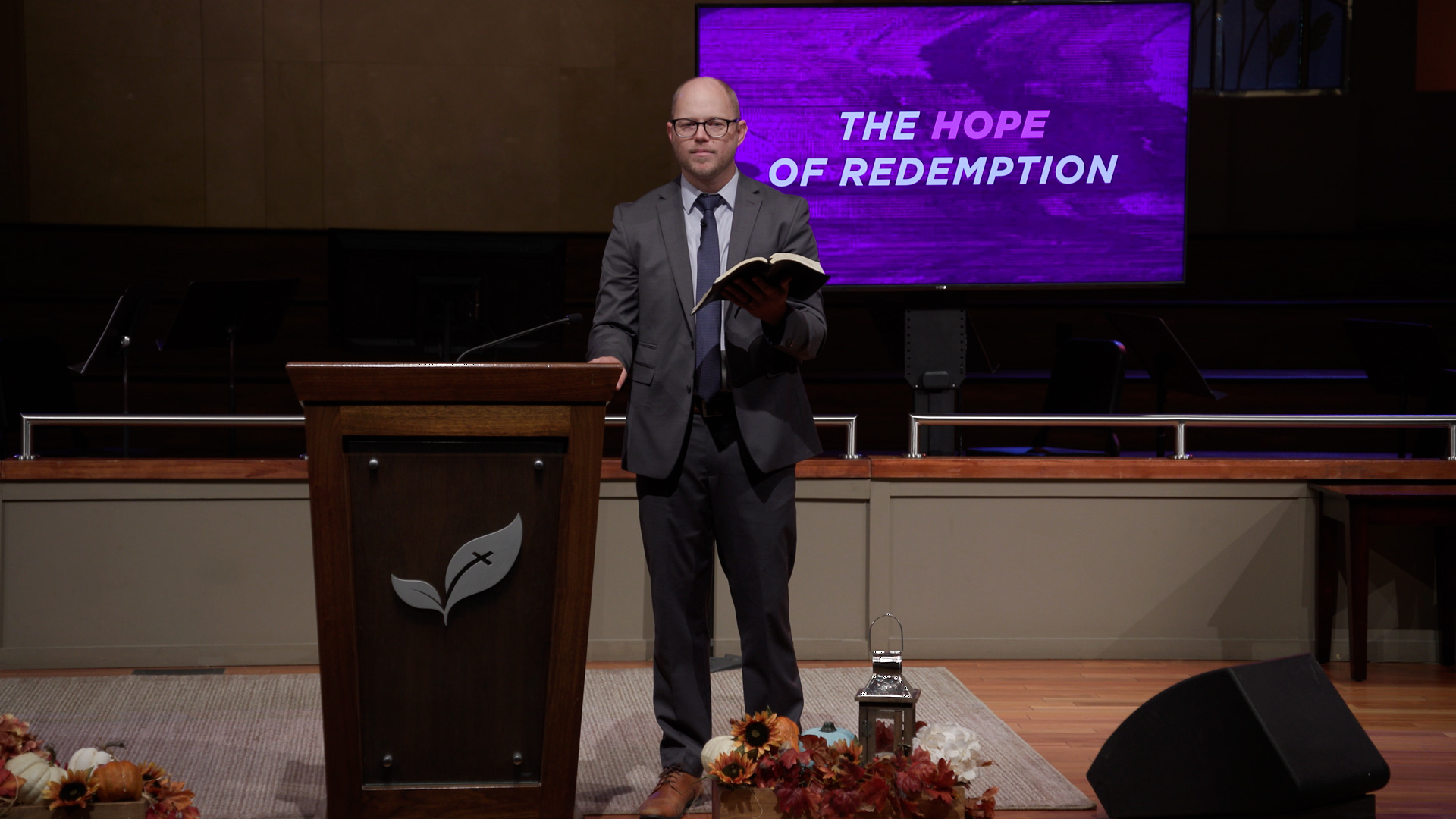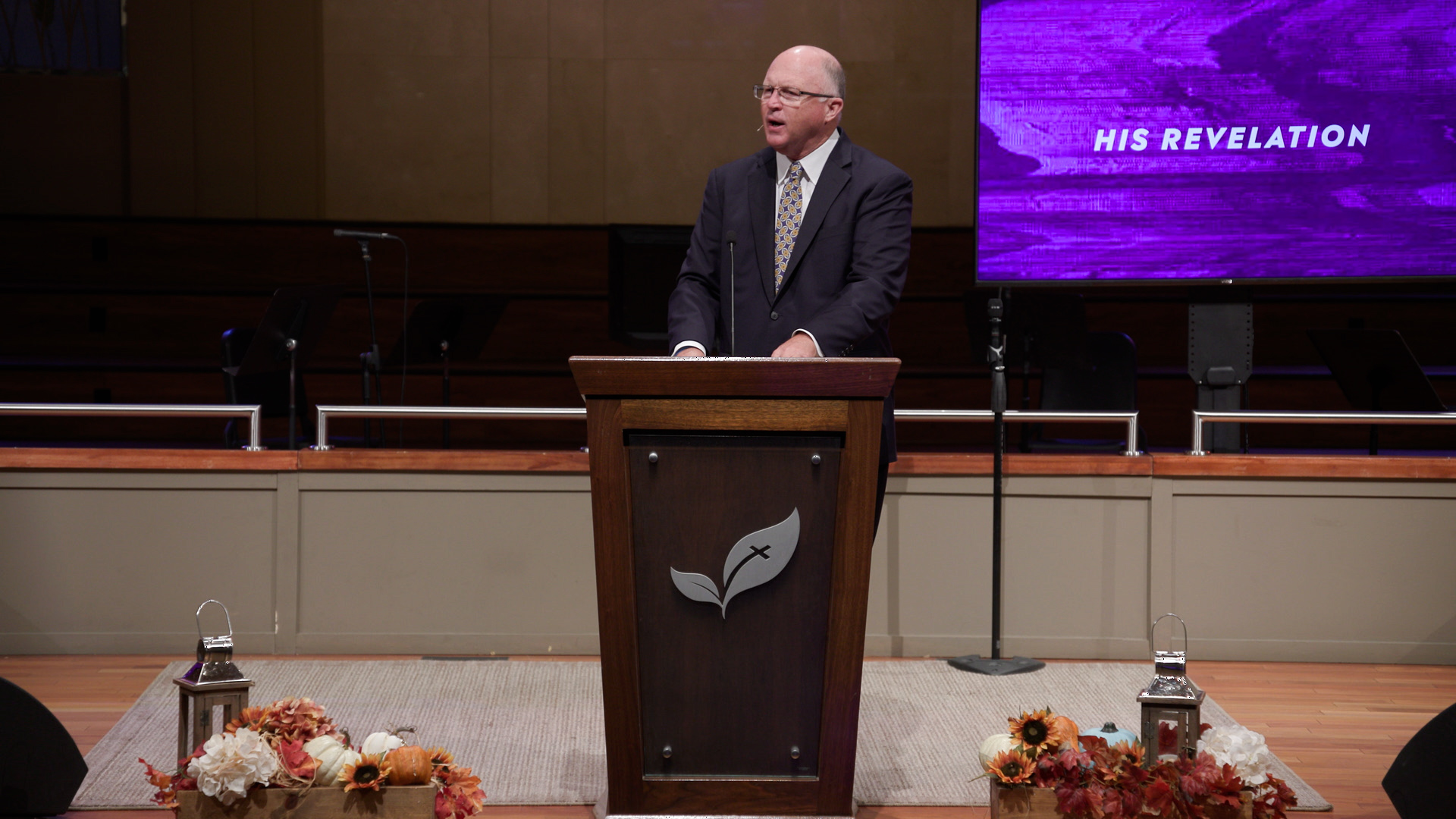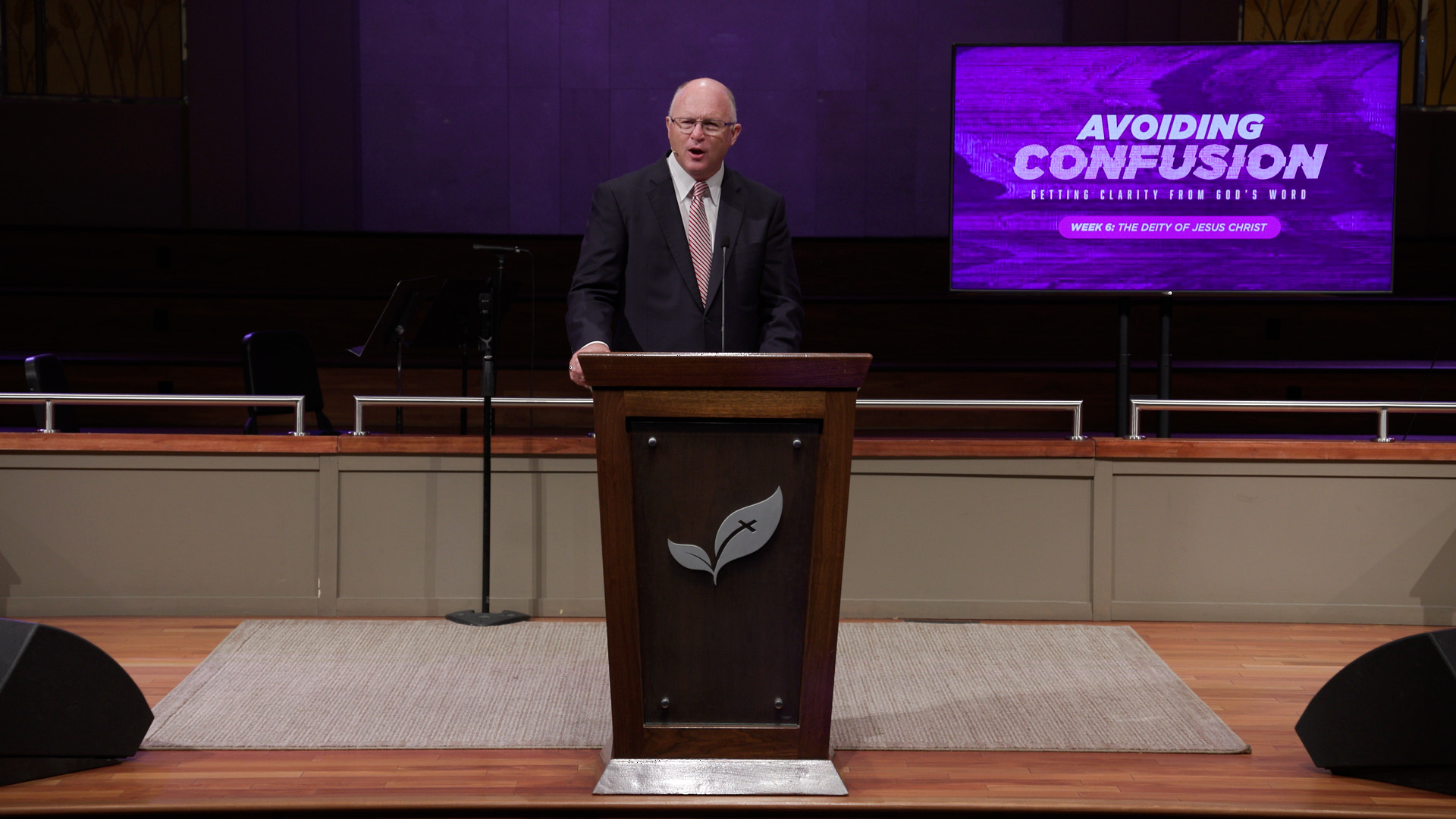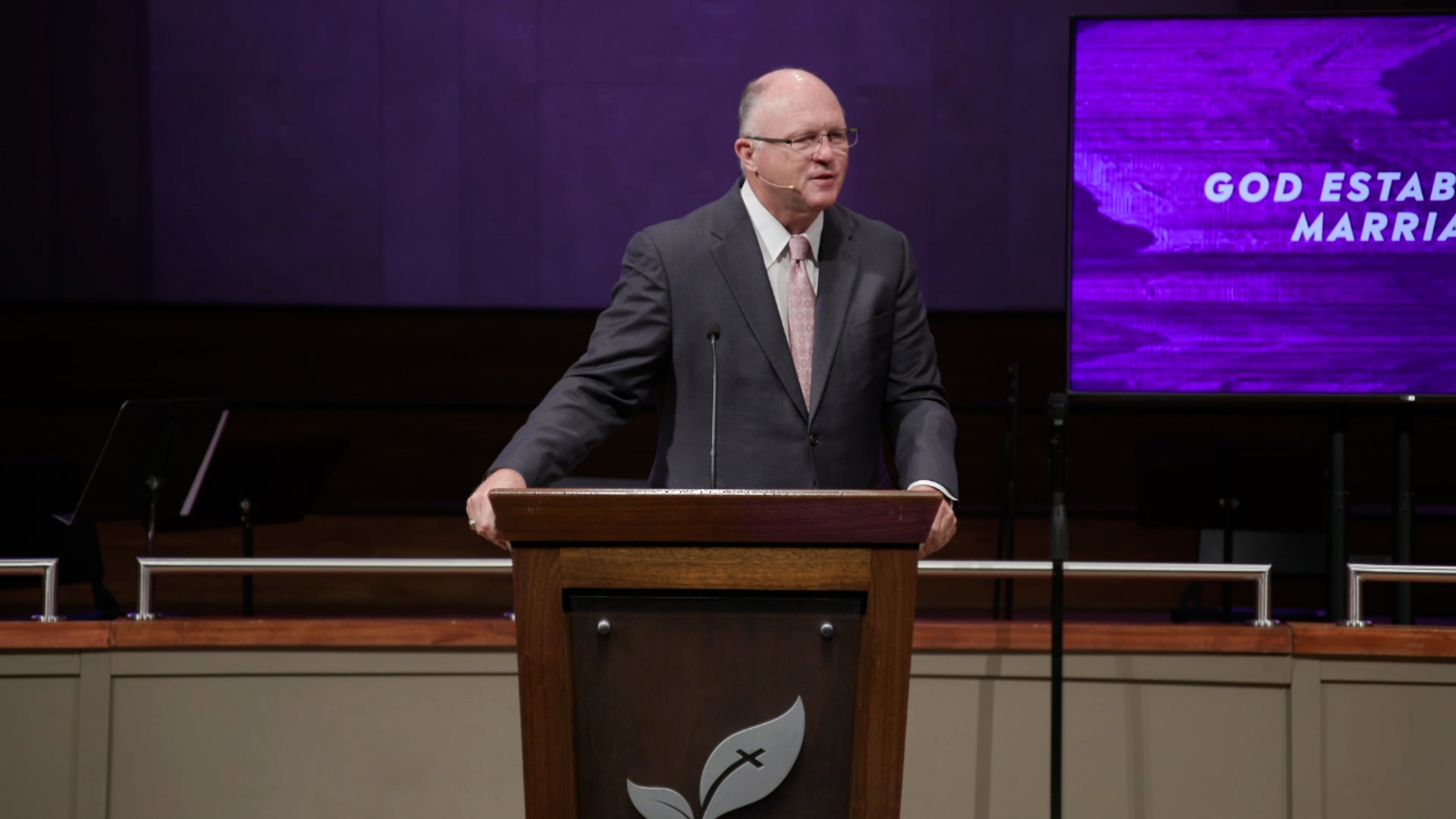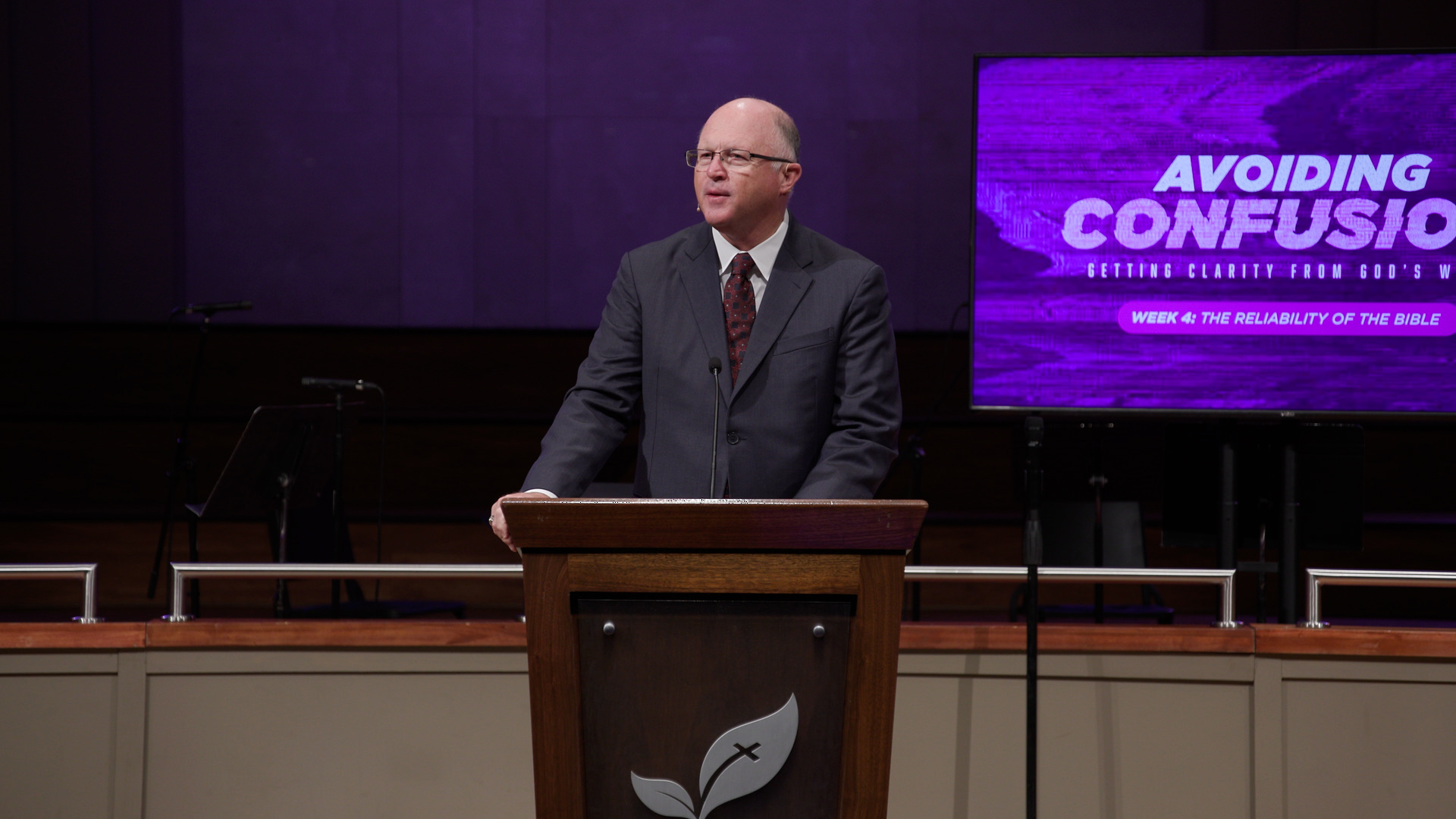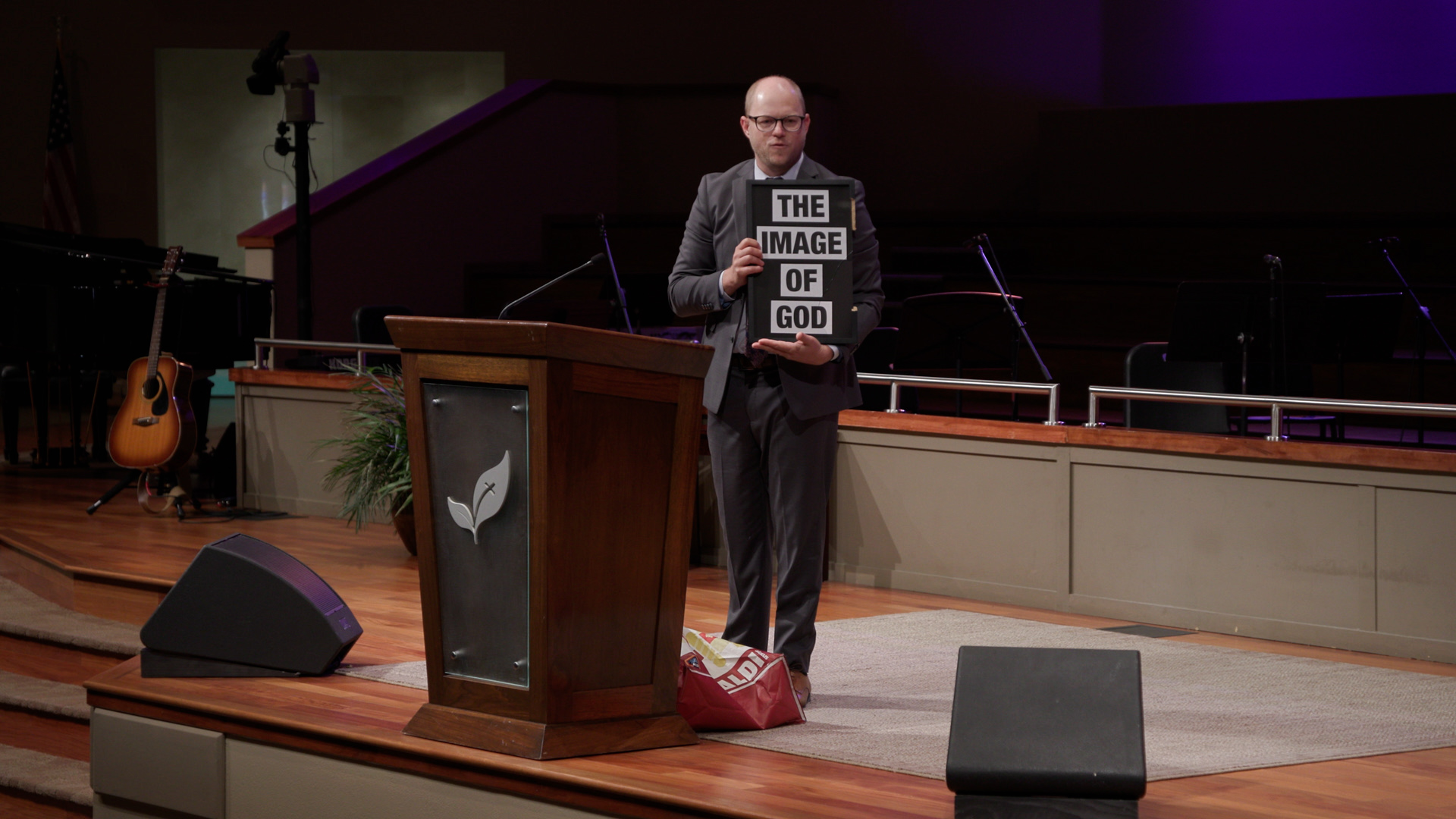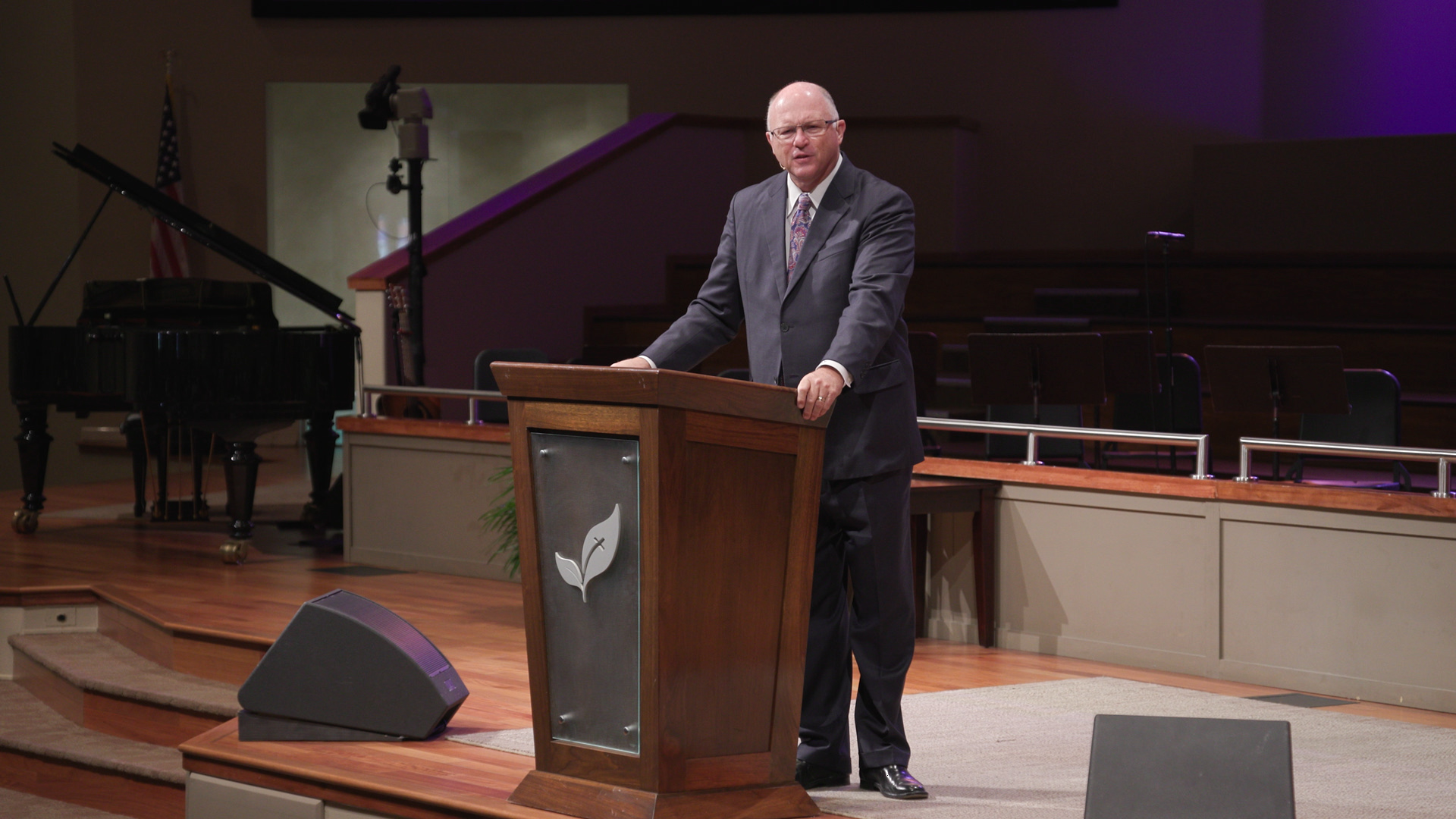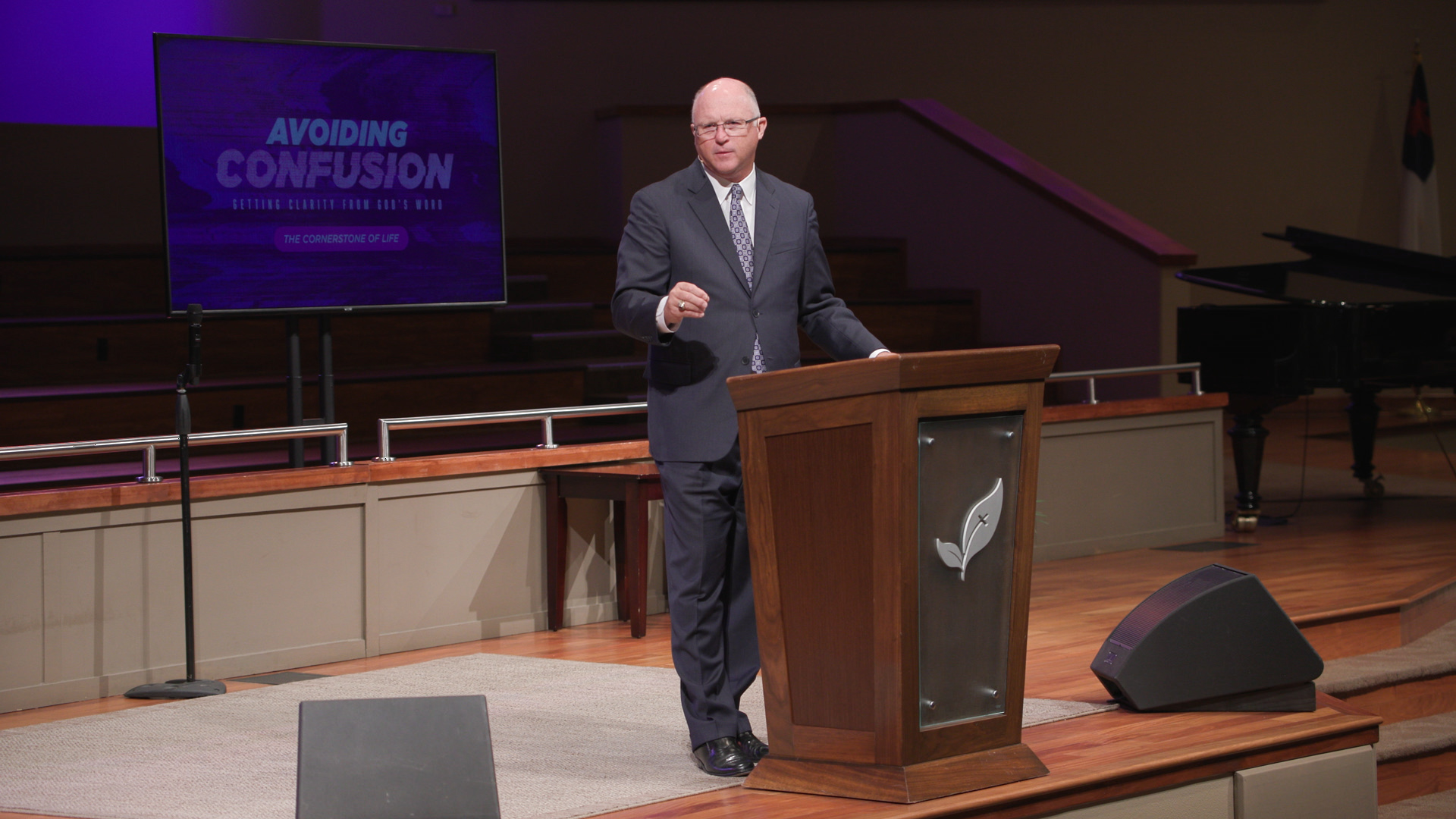Well, I want to ask you at this time to take your Bible and turn if you would to the Book of Micah. Turn to the Book of Micah and we're going to turn to chapter 6. I'm excited about this series that we have been enjoying together. The series is simply entitled avoid the confusion, how to avoid the confusion. And we live in a day when there are a lot of confusing issues and a lot of different messages. How many of you have noticed that even sometimes terms in the English language change and there's the same word, different meaning type scenario? We want to put it all to the scriptures and avoid the confusion as we grow in Christ during 2020.
Let's stand together for a scripture reading from Micah. Micah chapter 6. As I said, the notes are available in your seat there or at LBC.org, so if you'd like to grab those for further reference. Now, folks, this morning, I'm going to do something I think I've done once in 34 years, and so put your thinking caps on and help me here just a little bit. This morning I'm going to preach half a message. And some of you are going to say he's trying to trick us, I know he's got an angle. There's no trick with this, I'm going to preach half the message this morning and half the message tonight. I'm just going to warn you. And they're both going to be good, I'm going to tell you that right now.
But I want to encourage you, and I've been researching this for this message for some time. I started on Monday with sixty pages of notes. The average sermon that I preach for me is about sixteen to eighteen pages of written notes so that would have been several weeks of messages. I whittled it down, whittled it down, couldn't get it any further down than about thirty pages of notes. So I decided we're going to do half this morning and half tonight. Most of the positive application will be found tonight. Now, we're going to have some of that for sure this morning, you stay tuned for the last five to seven minutes of this message.
But a lot of the positive application with respect to the second half of the message will be tonight as we talk about loving mercy and walking humbly before the Lord. And so I want to encourage you. And how many of you say, all right, Pastor, here's the deal, I want to hear the message, I'll be back tonight at 5:00 to hear the message. Let me see where you are, all right, good. And you need to be. I know we have some members that are going to be traveling to work and different things, jump online at LBCLive.TV and get this message, I think it will be a help and a blessing to you. It will either cause you to miss lunch or break the message in two, that was the choice that I had, so I'm trying to be a loving pastor the older I get, living and kind to our members.
Micah chapter 6 and we're going to read beginning in verse number 1. "Hear ye now what the Lord saith; Arise, contend though before the mountains, and let the hills hear thy voice. Hear ye, O mountains, the Lord's controversy, and ye strong foundations of the earth, for the Lord hath a controversy with his people and he will plead with Israel. Oh, my people, what have I done unto thee and wherein have I wearied thee? Testify against me for I brought thee up out of the land of Egypt and redeemed thee out of the house of servants and I sent before these Moses and Aaron and Miriam. O, my people, remember now that Balak, king of Moab consulted and what Balaam the son of Beor answered him from Shittim unto Gilgal that ye may know the rightness of the Lord.
Wherewith shall I come before the Lord, and bow myself before the high God? Shall I come before him with burnt offerings, with calves of a year old? Will the Lord be pleased with thousands of rams, or with ten thousands of rivers of oil? Shall I give my firstborn for transgression, the fruit of my body for the sin of my soul? He had showed thee, O man, what is good, and what doth the Lord require of thee? But to do justly and to love mercy and to walk humbly with thy God."
This morning I would like to speak on the subject social justice or scriptural justice. We could define this social justice in the light of scripture, but we want to learn what does it mean to walk justly as Christian people in 2020. Let's pray together. Father, thank you for this time to begin the message that we will finish tonight, and I pray that you'd help us to get our brains around that and follow through in hearing an understanding and applying as Christians the truths of your word. Give us discernment and give us your mind as we study and preach today I ask in Jesus name, amen. You may be seated.
Well, Micah was a prophet at the same time as Isaiah from 736 until about 700 BC. And he was a prophet during the reign of Jotham, Ahaz and Hezekiah. And for those of you that remember some of the history of Israel and of Judah in particular, you'll recall that Jotham was a godly king, Ahaz was a very wicked king, he brought idolatress practices back into Israel and even offering his children as human sacrifices, that's how pagan he had become during his six year reign. Then Hezekiah reigned and though him temple worship was restored and a heart for God returned back to Israel.
But in 722 the Assyrian army defeated Israel. And it was during that time as well that Judah, the southern kingdom, had turned from God, much like America has turned from God. The Bible says in Isaiah 59:14 concerning Judah, "Truth has fallen in the streets." In other words, it was hard to find the truth. By the way, it's becoming harder to find the truth in America even this past week. Twitter and Facebook censoring true stories. One wonders what else they might sensor in the days ahead. Truth is falling in the streets, and that's why you ought to thank the Lord, as I do, that we can open the word of God and preach the truth like we are this morning.
Now, in Micah chapter 6 we have what could be referred to as a courtroom scene. Micah is the prophet, of course, and he is litigating and he is telling the people of Israel that God has a controversy with them. He says I brought you up out of Egypt, I brought you into the promised land. But what are you doing to show your heart for me? What has been your response? And so Micah gives the requirements of God to a nation that wants his blessing. And he says that there should be three responses to his goodness, that when God is good to us, that he expects that we would be good to others.
And so he says very plainly in verse number 8, "What doth the Lord require of thee?" Now, I don't know about you, when I see those words it piques my interest, because I want to know what the Lord wants from me. How many of you are agreeing with me on that this morning? What does the Lord require? Lord, you've saved me, you've given me eternal life. What do you want? How can I serve you?
And the prophet says what does the Lord require of thee, but – and then here are the three responses that he desires towards his goodness. First, he says I require that you do justly, to do justly. Secondly, to love mercy. Thirdly, to walk humbly with thy God. Now, we're going to focus this morning on doing justly, and this evening we'll come to the application with loving mercy and walking humbly. We want to understand the call of God upon his people to do justly or to walk in justness.
Now, we do not do justly or show mercy in order to earn salvation or merit with God. The Bible says, "For by grace are you saved through faith, and that not of yourselves, it is the gift of God." Salvation is the gift of God. We're not going to preach this morning to do some good stuff so that God will really like us and we can go to heaven because we're good. No, the Bible says none of us are good, but it does also say in Ephesians 2:10, "For we are his workmanship created in Christ Jesus unto good works which God hath before ordained that we should walk in them."
So I believe that from the Old and from the New Testament we are required to do justly and to walk in good works. Not for our salvation. Our salvation is afforded by the blood of Jesus Christ by the grace of God. But because as his people, we should be concerned about doing justly.
Now, there are three preliminary considerations I want to give to you concerning the subject of justice from the Bible. The first consideration is that God is the habitation of justice. God himself is the habitation of justice. Jeremiah 50:7, "All that found them have devoured them, and their adversity said, we offend not, because they have sinned against the Lord, the habitation of justice, even the Lord, the hope of their faith." So God's justice is founded in his essential nature. He is just. He is the habitation of justice. As the Creator and eternal king, he both establishes from his nature what is right and he maintains what he establishes by his laws. So God is the habitation, he is the originator of justice, and frankly, his word is the originator of many of the just laws in our society even today.
Secondly, I want you to remember as just an overarching consideration that God's people are to model just living. That God's people are to model just living. Now, a commitment to Jehovah God in the Old Testament was a commitment also to his community. In other words, if you are rightly relating to God, you will rightly relate to others. And so God's people should model this.
Many illustrations, but I love what the Bible says about David in 1 Chronicles 18:14. It says, "So David reigned over all Israel and executed judgment and justice among all people." And so when justice and judgment are executed properly, and with an awe in reverence of God, the people will rejoice. And so it was that God's people are to model just living.
To do justly is to literally practice righteous living. That's why America will only be great as long as America is good. As long as we practice righteous living then God will bless this land and he will bless your family. First, God is the habitation of justice, secondly God's people are to model just living.
Thirdly, men are responsible individually, and this is very important, this all will tie in our message as we go along. The Bible teaches that men are individually responsible to their creator. And why this is so important is because scriptural justice is going to put responsibility on the individual while social justice is going to blame the collective crowd. So scriptural justice says you as an individual are responsible before God, irrespective of what the crowd is doing.
So biblical justice speaks first to the heart of me as an individual and how I should live. It focuses on my responsibility to repent of my sin and to care for others. Social justice often focuses on blame, scriptural justice focuses on responsibility. Again, many scriptures teach this principle. Deuteronomy 24:16, "The fathers shall not be put to death for the children, neither shall the children be put to death for the fathers. Every man shall be put to death for his own sin."
Concerning the issues of capital punishment, God said you are going to have an individual responsibility. We're not going to provide capital punishment upon a child because of the sins of the father. That's not how it works biblically. Each generation is responsible for their own individual lives. And this is very contrasting to social justice's message today as it concerns previous sins of previous generations.
You can find this same principle in Ezekiel 14:12-14. And the Bible teaches there that while the nation of Israel had much for which you could give blame, nevertheless Noah, Daniel, and Job specifically mentioned there were responsible for their own testimonies. One of the tragedies of any philosophy of blame is when young people feel that every ill deed or sin that they commit is justifiable because of the culture in which they live. God says no, every individual must give an account.
Now, we understand the blame game, because it's as old as Adam and Eve. Do you remember that? There were only two people in the world and Adam and Eve blamed each other and even tried to blame God for their sin. And so we want to understand these three overarching introductory principles. Number one, God is the habitation of justice, number two, God's people should model just living, number three, men are individually responsible for their lives before God.
Now, with those biblical understandings lets jump into the outline today. And as I said, we're going to focus mostly on the first point today as we understand that justice must be defined biblically. When the Bible says to do justly, we want to define it biblically. We're going to see tonight that it must be displayed mercifully. We're going to see that it must be deployed humbly. But we want to begin by just understanding today what is justice, what is the biblical definition of justice, and then we're going to contrast it to some of the modern-day ideas of justice.
Now, when we come to this word in verse 8, and it's a wonderful word, what does God require of thee? To do justly. Now, biblical justice is the faithful application of the law of God. There's a basic definition. Scriptural justice is the faithful application of the law of God. So let's learn the biblical concept of justice this morning.
When we think of scriptural justice or biblical justice we see this work justly here in verse number 8. It speaks of righteousness, rectitude, righteousness of principle or practice. Makes sense to me, God wants his people, whether the nation of Israel, whether the modern church, to live righteously, to live with principled practice.
Israel then was being challenged by Micah to act justly. That is when they were in a socially superior position or more of a blessed position, that they should love their neighbor as themselves, which would be conforming to God's moral standard. That we are to love our neighbor as ourselves. That we are to help those that are weaker, whether 1250 Christmas boxes, as I mentioned a moment ago, or the mission's conference next week or a million other ways, God's people should, of all people, have a tender heart towards those in need.
Now, there are two forms of justice that we see with respect to our relationship to God and with others. First, there is communicative justice. This communicative justice is living in right relationship with God and others, giving people their due as the image bearers of God. Remember, we're all created in the image of God and that we, as we rightly related to God, should treat others as God would have us to treat them.
Then there is a distributive justice as well. That is that we impartially render judgment, we endeavor to right wrongs, and we understand that God ordains authorities for righting those wrongs. He ordains laws and even the courts as a place for the meeting out of justice. So it is a communicated justice from myself to the Lord and from myself to the world. And there is distributive justice, that is when something was wrong we as Christians should want to make it right.
Psalm 119:137, "Righteous art thou, O Lord, and upright are thy judgments." And so we want to follow the righteous judgments of the Lord. C.S. Lewis once wrote and famously said, in fact, about his conversion to Christ, "My argument against God was that the universe seems so cruel and unjust. But how had I got this idea of just and unjust? A man does not call a line crooked unless he has some idea of a straight line. What was I comparing this universe with when I called it unjust? Justice requires a standard, and there is no objective standard in the purposeless universe." In other words, the very fact that we're talking about justice and injustice is a testimony to the law giver himself, God Almighty.
So this is the biblical concept of justice. The Bible does speak of it, Christians should be concerned. In the Biblical definition to be merciful and to be concerned for justice. So this is the Biblical concept. Let's just look quickly and secondly at the Biblical practice of justice. How does that work? How can we do justly? Psalm 82:3 says that we're to defend the poor and the fatherless. James 1:27 says "Pure religion and undefiled before God and the fatherless before God is this, to visit the fatherless and the widows." God says I want to remember those that are orphaned, I want you to remember the widows. I want you to reach down and show them loving mercy and scriptural justice.
Proverbs 21:3, "Do justice to the afflicted and the needy." Psalm 41:1, "Blessed is he that considereth the poor. The Lord will deliver him in time of trouble." God does want us to be considerate of those who have need.
Now, we could spend the rest of the day giving what I would consider to be Biblical illustrations or living illustrations of the Biblical principle of justice. But I think of our bus ministry as one, and you pray that we can get our buses running once again. We received this week our seventh brand new bus. It's sitting over there, it's got about five miles on it or whatever and it's ready to go. And what are we doing with the bus ministry? We're going many times to broken homes, we're going to homes where daddy is in jail, we're going to homes where there's a difficult situation, maybe there have been drugs or challenges and children have not received a fair shot someone might say.
And what are we doing? We're sharing with them the love of Jesus Christ, the principles of the word of God. Tools with which someone might see their life completely change, and we've seen that happen hundreds and hundreds of times as we go out showing mercy in our community. I think of George Muller and the orphanages in the late 1800s there in England. Terri and I were able to visit these orphanages. They're not as large now, but just the fact that they exist some 200 years later is amazing, or 150 years later.
Children that their parents had died during the bubonic plague. And George Muller just by faith saying, you know, I want to see them receive a just opportunity. I want to see them experience the mercy of God. And at one time, his orphanages housed over 10,000 young children. He fed them, he told them the love of Christ, he taught them how to read. He was doing justly, showing mercy, and walking humbly.
I think of a classmate of mine named Sally from college who for 39 years has lived in Costa Rica where she founded an orphanage, where she has brought in hundreds and hundreds of children to her orphanage and she has fed them and she has led them to Christ. And she has seen them go on into marriage and to serve God in ministry and as engineers and as people that are being blessed of God and faithful in their churches.
You see, scriptural justice is not about burning the flag. It's not about screaming at a neighbor. It's about helping people in their time of need. Biblical justice is based on God's character, not the winds of culture.
Now sometimes, to be fair, culture is completely wrong. And I think in a few instances we would have to say even the church culture has gotten it completely wrong. Nothing would ever have stated that so loudly concerning the Christian culture as during the days of slavery. During the time of slavery, slavery understood as kidnapping a person from their home and enslaving them was punishable by death in the Old Testament. God judged his people for this practice in Amos chapter 1. Slavery in America was also judged by God in the form of a Civil War where over 600,000 people died.
However, God's people who practiced and participated in slavery did so because they had changed the law of God to meet their culture instead of striving to change the culture to meet the law of God. Thanks be to God this wrong was made right. And by the way, you don't often hear this story, but it was Christians who got under conviction about slavery and began to fight against slavery. Men like John Newton who wrote Amazing Grace, men like John Witherspoon who fought in the British Parliament for years until finally slavery was outlawed.
And so there have been times when Christians did not get it right. No one who's a Christian in this room that I know of has ever claimed to be perfect. But we're here today not to align ourselves to the culture but to align ourselves to the scripture, that's why we come to church. And when you align yourself with scripture you'll come down on the right side of the issue, whatever the issue is.
And so the God whom I worship has warned his followers repeatedly not to oppress the poor or the widows or the foreigners. And in countless passages he has caused us to reach out to those whom society despises. Deuteronomy 15:7 says, "If there be among you a poor man of one of thy brethren within any of the gates in thy land which the Lord thy God giveth thee, thou shalt not harden thy heart nor shut thine hand from thy poor brother." We should have a heart for those who have need and we should desire justice for them.
And you say, well, some are crying for a borderless society and they want us to educate, medicate, and incarcerate people from all different countries. And even while many of us would advocate the essential principal of legal entrance into our country, we also must have a heart, a tender heart for others in their time of need. Because I believe that God has a heart for the Jews and the Palestinians. God has a heart for the Africans and the Asians. God wants us to have a heart for everybody because Jesus died for everybody. And we should have a heart of justice and mercy for them.
So the Biblical concept is very, very well founded in the nature of God and the laws of God. And the Biblical practice is emphasized over and over again to do justly, to show mercy, and to walk humbly.
But I want to spend now the next several moments speaking to you about what I would call the secular counterfeits of scriptural justice. What we often hear of today as social justice. And I do not believe that every tenant of social justice is necessarily wrong, but I do believe that the majority of today's social justice movement is going against the clear teachings of scripture.
Isaiah 5:20 says, "Whoa unto them that call evil good, and good evil." Doctor Thomas Sowell of the Stanford University wrote concerning social justice, "What they call justice encompasses far more than any given society is causally responsible for. Crusaders for social justice seek to correct not merely the sins of man, but the oversights of God or the accidents of history. What they are really seeking is a universe tailor made to their vision of equality."
Traditionally justice is a process. A defendant is said to have justice if there was a due process, regardless of whether the outcome was acquittal or prosecution. A fair fight is one which both sides kept the rules. If the process itself meets the right standard, then no matter the outcome, you had your chance. But this is not what is meant by today's social justice movement. Rules are set aside. With social justice, outcomes must be grounded in partiality, so outcomes are guaranteed for certain groups.
Now, equity is very important in justice, but the truth is, outcomes will vary. If you were to take two men and put them into a boxing ring, perhaps Doctor Rasmussen and myself, which I think he might get the better of me, he's a little bigger than I am. But if you were to put us into a boxing ring, it's the same ring and we're going to have the exact same rules and we're standing in the rules and the referee is watching over us and making sure that those rules are met to their exact standard. Then we are in a just situation.
Now, we cannot determine the outcome. It would be unfair if I said I'll fight Doctor Rasmussen if he ties one arm behind his back, that would not be justice. But so long as the opportunity is the same, then the outcome is what the outcome will become, but we are not going to take the system and change it before the process begins. We're going to allow a just opportunity in that situation. But that's not exactly what is meant in so many interpretations of justice today.
I want to speak to you about three of the injustices, or three, rather, of the social justice movements that we see on the horizon today. And as I speak on social justice, I want to state that, yes, there have been wrongs and sometimes there's an overreaction to those wrongs. And sometimes, as we'll see tonight, even churches have not rightly responded. But we're seeing today a series of social justice movements that are denying the very foundation of God's law and God's character.
Let me share a few of them with you. First of all there is what I would call secularized social justice. The secular concept of justice tends to place people in a victim category. And those categories are almost innumerable anymore. We know of the categories of minority equality, the LBGTQ movement. Even the LBGTQ movement has become so powerful here in California that now recently if you have a baby and you go for the birth certificate, I want you to see what it now says in California. It no longer says mother or father, it says parent 1, parent 2 in the state of California when you apply because they did not want to offend a transgender family or another type of family. This is how radically involved and how powerfully involved the LBGTQ social justice movement has become. It's changing much of the fiber of our society.
You also will hear of women's rights, global inequality, animal rights. You'll hear sometimes of vegetarianism, all kinds of things. You'll hear about people who have felt even a micro aggression from someone else and they want to make a complaint about. People feel oppressed. And if you are in multiple groups, if you have a concern about animal rights or if you have a concern about LGBTQ or if you're of a particular cultural background, then it becomes what they call intersectionality, and you have a very powerful voice then, because you have expertise, supposedly, from many, many various areas.
And people today, and we see it on the news every day, they say I'm offended. My ancestors were offended. And I'm offended because I'm this because I'm a man or because I'm a woman or because of this or because of that. And then someone will say me too, I'm offended too. And it just begins to become a message in our society.
And the victim class grows daily. Some people say, well, dead people offend me. You offend me. I don't like the way you said that. The fact of the matter is that in some cases, if you aren't in one of the offended categories, then you just need to sit down and shut up, because your opinion doesn't matter. And so we're seeing today this cancellation type of a society.
Now, biblically what do we do with all of this? The Bible is very clear in Romans 5:12, "Wherefore as by one man's sin came upon this earth. Sin entered into the world and death by sin, and death passed upon all men, for all have sinners." What does the Christian say about all the wrongs in the world? Well, there are many things to say, but one of the fundamental things that we would say is that we are all sinners. And that the ground is level at the cross when we come to the Lord Jesus Christ.
We must recognize today that all of us have a need. Yet what is being said, and Thomas Sowell said this so well, they say they want a level playing field, but really they're tilting the playing field, they're trying to affect the oversights of God. So they're taking the perception of their difficult experience and wanting to somehow change or tilt the level playing field. Listen to what Doctor Sowell of Stanford University says about this form of social justice.
[Video starts]
Whenever I hear notions of fairness in education, I think back to my own education and I thank God my teachers were unfair to me when I was a kid growing up in Harlem. One of these teachers was a lady named Miss Simon, who belonged to what might be called the General Patton School of Education. I cannot even imagine that Miss Simon gave a moment's thought to my self-esteem. Every word that we misspelled in her class had to be written fifty times – not in class, but as part of our homework, and there was always plenty of other homework from her and other teachers. And so you misspell four or five words, and you had quite an evening ahead of you. Very little chance of listening to The Lone Ranger.
Now, was this fair in Rawlsian terms? And the answer is no. like many of the children in Harlem at that time, I came from a home where nobody had gone beyond elementary school. I still remember what a big fuss was made when I was promoted to the 7th grade because I would go on further than anyone else. In later years when I graduated from Harvard, there was no such fuss, they expected me to.
But fairness was never an option. There was nothing that Miss Simon or anybody else could do about the fact that we came from homes where we did not have books and magazines and we were not as familiar with those words as people from other neighborhoods might have been. So that was never an option. Nothing that schools could have done would have changed that. It would have been an irresponsible self-indulgence for them to have pretended to make things fair. If there's anything worse than unfairness, it is make-believe fairness."
[Video ends]
I love that last line, "If there's anything worse than unfairness, it is make-believe fairness." You see, social justice wants an outcome guaranteed for whatever group is involved. Voddie Baucham who is a graduate of Oxford University and the Dean of Theology at African Christian University is a man that has written much on the subject, and he wrote, "It's toxic terminology. When you look at prominent social justice groups and the issues they are fighting for, same sex marriage, abortion, affirmative action for women and select minorities, redistribution of justly earned income or power, it's clear that these are toxic to our culture and incompatible with the biblical understanding of true justice." Let's listen to Doctor Baucham as he mentions some of these principles.
[Video starts]
Then we need to find out who's to blame for that. If this group doesn't do as well academically, if this group doesn't do as well economically, if this group is not as well represented politically. And then finally there needs to be a redistribution of power and resources in order to redress those grievances. That's the answer. And that has to be the answer, according to social justice.
[Video ends]
Author William Young says, 'Social justice as a state redistribution of advantages and resources is essentially socialism or Marxism." And the fact is that every one of us as Christians should affirm the value of everyone else's life, that's a basic understood. We are created in the image of God, we are made in his likeliness, Genesis 1:26. We all have a human nature. That, unfortunately, is a fallen nature as I said a moment ago, for all have sin and come short of the glory of God. But the fact is that we all have the same need for a savior.
We are of one human race, we have one human nature. There's not a white nature, a black nature, a brown nature, yellow. All of us have a human nature. And yet, oftentimes we see that there is a representation to try to say that there are major spiritual differences. There are not. We are all a fallen nature.
Now, the social justice movement that is called the Black Lives Matter organization is extremely opposed to scripture on a number of points. All of us would affirm that black lives matter, but most of you now have come to realize there's a huge difference between saying that someone's life matters and that particular organization itself. On their website, Patricia Cullors and Alicia Garza, the founders stated clearly that they are both Marxists. Cullors said, "We were trained Marxists. We are versed in these ideological theories."
Also from their website, and some of this has since been removed, it says, "We make space for transgender brothers and sisters to lead. We foster a queer affirming network. When we gather, we do so with the intention of freeing ourselves from the tight grip of the heteronormative thinking," meaning biblical thinking about male and female, about the traditional family. And they're telling us just straight up that they're Marxists, they're socialists, they're against the Christian family.
They are affirming the pro-queer agenda. The mentor of Ms. Cullors was Eric Mann, a part of the Weather Underground seeking to overthrow the United States Government. So this social justice group in particular, as many of them, actually stands against most of what we believe. And that's why I'm standing here today issuing what is my responsibility, a warning to the flock, to use discernment and to look at all these movements through the lens of scripture.
Hershel Walker has recently studied and made some statements along these lines. He said, All you athletes out there, all you companies, all you professional teams that are promoting BlackLivesMatter.org, are you telling me that you're promoting someone that said they're a trained Marxist? Listen to what Hershel Walker recently said to some of his fellow athletes.
[Video starts]
Interviewer: Welcome back NFL legend Hershel Walker, getting some attention on social media last week for his views on Black Lives Matter and what he told us last Sunday on Sunday Morning Futures. Here's what he said to team owners, professional athletes, and leaders in Washington who support the Black Lives Matter organization."
Interviewee: Is this who you're supporting? Because a trained Marxist tells you that they're anti-government, they're anti-American, they're anti-Christian, they're anti everything.
Interviewer: Hershel Walker joins me right now, and Hershel, it is great to see you again. We talked about this on Sunday, on Sunday Morning Futures. Tell us how you figured out that Black Lives Matter was not what they said they are in your view.
Interviewee: Well, I did my research and that's the reason I tell so many people do your own research. Because, you know, one of the things where I think there's a problem today is you know you have a lot of news companies that's supposed to give you the news, but they give you their opinion. They don't tell you the truth. They tell you what they feel, they tell you what they think, but they don't tell you the truth. Well, BLM on their own website it tells you who they are.
And then when I heard one of the cofounders say that we're trained Marxists, I took it from their own words and I wanted people to wake up. I said, guys, is this who you're supporting? It doesn't matter whether you're giving them money, it doesn't matter whether you're promoting them on t-shirts or promoting them on stadium or in the baseball diamond, but you're promoting someone that said that they're Marxists. And I said that's what I don't like, that's what I disagree with. I love America. We've got a long ways to go but we can't do it if we're not together.
[Video ends]
And like Hershel Walker, a Christian man and I share his conviction that all lives matter. I share his conviction that when there's something that is done wrong or illegally, even by someone in law enforcement, that that should be dealt with. We understand these things. But we also understand that we're to pray for those in authority and that to completely deconstruct or to destroy our foundations is not the answer for this country.
And he was speaking specifically about the support that the BLM organization. This queer affirming organization, this organization that's against the heteronormative family. They've received $500,000 from Gatorade, $250,000 from Microsoft, a half a million from Airbnb, $500,000 from Nabisco, $500,000 from Dropbox.
And studies have been done to try to determine, okay, how much of that money went to say George Floyd's family? How much of that money went to the family of these that have had these victimizations? And so far, it appears that the money is going to the organization for the political advancement.
And what I want you to understand today is that our responsibility as Christians is to also be concerned, as we'll see tonight, for the victims as well. For the families, for those that are hurting, for those that are left behind. Again, Tomas Sowell speaks to the issue, and speaks about these inequities. Scott Allen in his book Why Social Justice is Not Biblical Justice said "Social Justice is deconstructing traditional systems and structures deemed to be oppressive and redistributing power and resources from oppressors to their victims in the pursuit of equality outcome. It is obsessed with power, privilege, oppression and victimization. It uses pragmatic tactics to _____ dissenters into submission. It fixates on identity markers such as class, race, gender, sexual orientation. It is openly hostile to Judea Christian religion. It was reimagined as Marxism 2.0." Let's listen to Doctor Sowell again as he speaks about social justice.
[Video starts]
The people who manned the community movement around the world before the Soviet Union was established didn't devote themselves to this cause for the sake of creating gulags and secret police and territorial aggrandizement. They did it because they were seeking social justice. But what actually happened shows some of the cost and some of the dangers of that.
[Video ends]
Social justice sometimes will get a crowd together, will raise money when someone is mistreated, but scriptural justice is there to support the family the day after, the month after, the year after. In the community, preaching the gospel. In the community, feeding, helping, encouraging year in and year out. That's our responsibility as the church. And so we see first of all secularized social justice as being a counterfeit to scriptural justice.
Notice secondly something that some have asked about, and that is what is called often the critical race theory. The critical race theory. Now, again, as we consider the subject of cultures and as we consider the subject across our land of the various cultural backgrounds, we acknowledge that there have been sins of partiality. We acknowledge that racism is a sin. We acknowledge, of course, that slavery was a sin. The Bible condemns these things.
And I want you to turn for a moment to James 2:8. Before we look specifically at the critical race theory which is coming into a lot of your workplaces now in training and so forth, what does the Bible say about how we should treat others? James 2:8. And I preached an entire message on racism about two months ago and you're welcome to go back online and get that. We talked about where we stand before the Lord.
But James 2:8 says, "If you fulfill the royal law according to the scriptures, thou shalt love thy neighbor as themselves, ye do well. But if ye have respect to persons, ye commit sin, and are convinced of the law as transgressors." Now, I believe with all of my heart that we ought to love our neighbor, we ought to care for them, and we ought to have a welcoming spirit in our church toward anybody and everybody. No matter what their background is, no matter where they've come from, no matter what they've been involved in. That God has commanded us as a church that we are to treat one another lovingly and equally. That the ground is level at the cross, that would be a good time for an amen this morning. That's not only what we believe, it's what we have endeavored to practice here for almost 35 years.
But the critical race theory speaking about what they call systemic racism says that there's an unconscious bias that's built into the structure of western society. "This cannot be remedied apart from the wholesale, again, dismantling and restructuring of political mechanisms, economic policies, moral standards, and other social norms." So here's another cry. And we hear it in different terms, defund the police or put in this policy or that policy. But again, they're calling for radical changes.
The term racism describes a uniquely white pathology. Members of less privileged, ethnic groups are victims and not perpetrators of social injustice, and it is therefore legitimate for them to retaliate with retributive violence or expressions of ethnic contempt. Whiteness is therefore an evil that must be confessed and repudiated, but without any guarantee of forgiveness.
Now let me just pause right here to say no matter what our cultural ethnic background, and this is very important, no one has the secret knowledge of another man's heart. None of us. One of my major issues with the critical race theory is the broad brushed assumption that an entire group of people are racist. That should not be assumed from white to black, from black to white. And by the way, at Lancaster Baptist Church, we are all brothers and sisters in Jesus Christ.
But the critical race theory is endeavoring to divide by acting as though they know everyone's heart. Wall Street Journal October 5, 2020, "At The Department of Homeland Security, diversity trainers held a training on micro aggressions. The trainers insisted that statements such as America is a land of opportunity, everybody can succeed in this society if they work hard, and I believe the most qualified person should get a job are all racist and harmful." And so the critical race theory diverts attention really again from the real problems, that we all are sinners, that we all should turn to the Lord Jesus Christ and treat one another, love our neighbor as ourselves. And really you could sum this up in one statement. We need to treat others the way God wants us to treat them. And when you do, you will treat them justly.
So we have the secular concept of social justice, we have the critical race theory that's being promoted. And then thirdly and amazingly, we have what I will call the liberal religious justice services or systems. Religious social justice. Some of you grew up in churches where the way to get saved was to march or to fight for social justice. I was recently on a committee of folks with the County of Los Angeles, and I was speaking to one of the other committee members and I began to ask this committee member about their salvation. How did they know for sure that Jesus Christ was their savior, that they would go to heaven someday?
The first two words out of their mouth, social justice. In other words, the way to please God is to fight for social justice in the mindset of a growing number of churches in America. They are literally making issues. That's why you see the rainbow flag on churches now. Social justice has affected the church that they must promote LGBTQ. There are many other influences that have come into the church.
Some are saying that if you don't do works of social justice, you're not preaching the gospel. Now, ladies and gentlemen, let's be very clear this morning. The gospel is the death, burial, and resurrection of Jesus Christ. And we should do biblical justice. We should feed the poor, we should help people in need, we should love everyone irrespective of their background. And Lancaster Baptist, just in this past year in the midst of COVID we're on track to send another one million dollars to people with orphanages and church plants all around this world. And we certainly should do more and more.
But listen, we don't do that to get saved. The only way that someone is saved is by putting their faith in Jesus Christ. But there are now churches teaching that social justice is a part of the gospel. In this particular instance on this subject I appreciate the words of John MacArthur who wrote, "Social justice and the world uses of that term entails political ideas that are deemed sophisticated, namely identity politics, critical race theory, the redistribution of wealth and other radical or socialist policies." Those ideas were fist popularized and propagated in the secular academy where they are now regarded as received wisdom, and have become a dominating part of popular culture. Evangelicals who are chasing the culture as latecomers to the party of those who advocate social justice are just Johnny-come-lately to this issue.
Now, the Bible says, and I want you to turn here, please, Galatians 1:8, and I want you to see what the Bible says about the gospel. We know in 1 Corinthians 15 the gospel is the death, burial and resurrection of Jesus Christ. But Satan has always tried to attach other stuff to the gospel. And in Galatians 1:8 we read these words, "But thou we or an angel from heaven preach any other gospel unto you than that which we have preached unto you, let him be accursed." Friends, when someone says Jesus is awesome but you've got to be involved in social justice to earn your way to heaven, that is another gospel. And we must understand that much of the terminology, the philosophy and even the attacks on theology that we're seeing today are simply categorized as another gospel. We must not inject another issue into the gospel.
Being missionally minded or being works and service minded, that is wonderful. That is even biblical. But to attach it to the gospel as a way to get saved is heretical. And so we see that this religious involvement is now actually, watch this, the liberal church in America with its socialist leanings is now actually fighting against righteousness and fighting against truth. Listen to Doctor Baucham as he describes a particular group called Faithful America Group. A Christian organization so called.
[Video starts]
Faithful America has on their page some of their victories and exploits in fighting for justice. Again, largest online Christian group fighting for social justice. What have they accomplished? Well, they fought back against Hobby Lobby, that's number one on their list, they fought back against Hobby Lobby. Convinced Google to drop World Vision. Convinced Google to drop World Vision. Three, forced MSNBC to drop The Family Research Council. Are you seeing a pattern here?
[Video ends]
It goes on, and you can Google Doctor Voddie Baucham and listen to some of these yourself. Again, an Oxford graduate, a compassionate man. But it's amazing, there was a Christian high school where the principle turned out to be living in a homosexual lifestyle. He was fired. But this group, Faithful America Christian Group, they literally got involved and sued the school in order to put that principal back in his position of leadership. They are a social justice movement taking up unbiblical and liberal causes and fighting against churches like this. And that's where it's come to with this particular philosophy of the religious social justice movement.
Oh that we would remember today that many evangelicals are beginning to employ the same rhetoric, the same rationale, the same terminology of victimhood versus oppression. And many times it's because of a feeling of guilt or whatever. It's because of not being grounded in the scriptures, I do not know. What I want you to know is that saving truth is a treasure and we must guard it. We must not pollute it or add to it.
Turn to one more verse, Colossians 2:8. We're approaching the halfway point. How many of you agree that I did the right thing to make this a two-part message? Colossians 2:8, "Beware, lest any man spoil you." Now look right here, the word spoil means to take away. And we're seeing a lot of 18 to 30-year old's that are, from their heart they're compassionate, they want people to be treated right. They're concerned. And I applaud them for that.
But they don't know sometimes what they're getting sucked into. They are getting sucked into what their fathers fought against in the military of the United States of America. And the word spoil means to suck you into, literally means to take away, to take you away. "Beware lest any many spoil you through philosophy and vain deceit after the tradition of men, after the rudiments of this world, and not after Christ."
And so this morning we have seen what is biblical justice, how does it work, and what are some of the counterfeit types of justice that are actually going against the Bible's teachings. Tonight we're going to see how biblical justice acts, and don't miss tonight. Give a full and fair hearing to this message. We're going to learn what it means to act in mercy and with humility.
But as we close I want to just share with you some really good news. I want to remind you where justice can be found. You see, there's not enough in the world. Okay, where can it be found? And I want you to know that it can be found and I want you to understand with me today that there can be justice in our lives. We know that injustice exists and that can be discouraging.
But let's close with two final thoughts and we'll jump down to the conclusion here for just a moment if you have the outline this morning. The first thing I want to say as we close this morning is that justice has been provided for everyone. You say what do you mean by that? Well, I say this because according to the Bible, all are sinners, Romans 3:10. There are none righteous, no, not one. I don't have time to read Romans 3:10-18, but it talks about men that are going after their own way and men that are murdering and men that are cursing and men that are hateful.
And God says, "I saw the human race in their condition. I saw that by one man's sin entered into the world and death passed upon all men." All of us, according to the Bible, are a fallen race. Where all of us, in the same spiritual boat, if you will, a fallen race, separated from God. But Jesus Christ came to bring justification. He came to bring justice for us. And justice is not merely on the economic scale. The greatest justice you can find is to be made right with God through the Lord Jesus Christ.
Turn in your Bible to Romans 5:17. I want you to see justice and where it can be found in the Bible. Romans 5:17, someone says, well, how could a loving God let people die and spend eternity without him? That's not his will. He's not willing that any should perish but that all should come to repentance. Romans 5:17, "For if by one man's offense death reigned by one," that's Adam. Someone says, "Well, how could Adam be responsible to bring sin, if by one man, sin came into the world?"
Notice, "Much more they would receive abundance of grace of the gift of righteousness shall reign in life by one Jesus Christ." Therefore as by the offense of one, judgment came upon all men to condemnation, even so," the Bible says, "that through Christ by the righteousness of one the free gift came upon all men unto justification of life. For as by one man's disobedience, meaning we're made sinners, so by the obedience of one shall many be made righteous." Listen, whatever your trial, whatever your injustice, hear me this morning. By one man, Adam, we were all judged. By one man we are all in a sinful race. Adam is the federal head of the human race.
And someone says, well, that's not just. How can I be judged because of that? By one man we are judged. But by one man, the God man, the perfect man, the sinless son of God, we can be set free. And when Jesus went to the cross of Calvary, this one who lived a perfectly sinless life, this one who was tipped in all points like as we are and yet never sinned. This perfectly sinless Savior, when he shed his bled on the cross of Calvary, the greatest act of justice the world has ever seen was there on the cross of Calvary.
And when we come to him and say Lord, instead of blaming everybody else I just want to be honest before you, I'm a sinner. And I want your forgiveness and I want a relationship with you. And when we come to the Lord Jesus Christ with humility, the Bible says but God committed his love toward us and while we were yet sinners Christ died for us. Much more than being now justified by his blood, we shall be saved from wrath through him. There is salvation at the cross, there is healing at the cross, there is justification at the cross, there is mercy at the cross, there is justice at the cross.
And let me tell you something social justice has no cross. There's no cross. There's no covering for sin in social justice. If you spent your whole life feeding the hungry and helping the poor and marching and picketing and screaming and organizing and you reject the cross, you are lost and on your way to an eternity without God. Because you missed the point of God's love and God's justice. And his point of justice was shown to us on the cross of Calvary. And as long as man is a sinner, listen, there's going to be murder and racism and immorality and injustice and bias.
Only Jesus Christ can save a sinner and change a heart. And when people get saved and countries turn back to God, love will increase and justice and righteousness will increase. And neighbors will talk again. When we understand that Jesus saves and Jesus Christ makes a difference. Justice has been provided.
So forget everything that's bad about the world for a moment and let me ask you this question. How's it going in your heart? Do you know his mercy? Have you experienced his justice in taking you as a sinner, as a castaway and bringing you in with love? Have you experienced that, because that is the love, justice, and mercy that God has for you? Justice has been provided.
And let me close this morning by saying justice is coming again. Jesus is coming again. You know that Christmas passage we sometimes read, Isaiah 9:6, "For unto us a child is born, unto us a son is given. And the government shall be upon his shoulder. And his name shall be called Wonderful Counselor, the Mighty God, the Everlasting Father, the Prince of Peace. Of the increase of his government and peace there shall be no end. Upon the throne of David and upon his kingdom to order it. And to establish it with judgment and with justice from henceforth, even forever, the Lord of hosts will perform it."
You see, justice will not fully be known until the just one returns. And the just one is Jesus Christ and he said in John 14, "If I go to prepare a place for you, I will come again that where I am, there ye will be also." I'm not going to be able to solve all the injustices in this world. And you're not going to be able to solve all the injustices in this world. But there is coming a day at the second coming of Jesus Christ when he will make every wrong right. The things that you don't understand, the things that your kids think are not fair. Listen, our hope must be in Jesus Christ because he will come and the government will be upon his shoulder.
And during his millennial reign the Bible tells me that little children will walk right by a lion. And a lamb will walk right by a snake, and everyone will come together in love and peace and harmony in the coming kingdom of Jesus Christ. Don't put your hope in some organizer. Don't put your hope in some organization. Put your hope in the one who shed his blood for you. And you will find justice and peace in the wonderful, finished work of Jesus Christ.
Tonight we're going to learn a little bit more about justice. We've seen it defined and contrasted. Tonight we'll learn how to be that merciful and humble church that this community needs.
[End of Audio]

